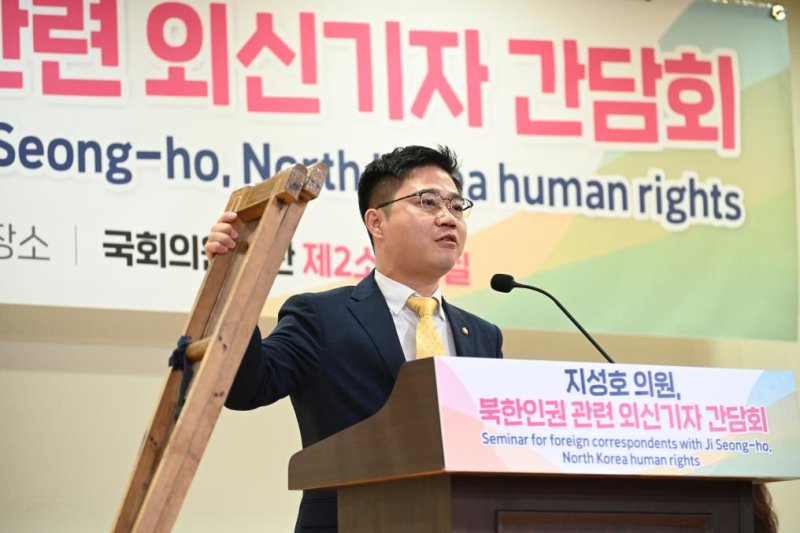1 of 5 | Ji Seong-ho, a North Korean defector who was elected to South Korea's parliament, introduced a bill on Friday that would provide compensation to victims of human rights abuses in North Korea. File Photo by Thomas Maresca/UPI
SEOUL, May 28 (UPI) -- Ji Seong-ho, a North Korean defector who was elected to South Korea's parliament last year, introduced a bill Friday that would provide financial compensation to victims of human rights abuses in North Korea.
"Countless cases of severe human rights violations by the North Korean regime are still ongoing," Ji said at a news conference held via Zoom. "That's why we need the special act on the compensation for North Korean human rights violations."
According to the bill, the South Korean government would create a fund to pay defectors, drawing resources from the seizure of North Korean assets such as vessels that enter South Korean territory.
The bill would also help to redress past injustices and "be useful for our future reunification process and to inform our society of the reality of the human rights violation in North Korea," Ji said.
The defector-turned-politician lost an arm and a leg at age 13 after being hit by a train in North Korea while attempting to steal coal to sell for food. Ji managed to escape the country on crutches in 2006 and later became an activist, rising to international fame when he was invited to the 2018 State of the Union address by then-U.S. President Donald Trump. He ran for a seat in South Korea's National Assembly and was elected in April 2020.
Ji was joined at the news conference by others who have sought legal remedy against North Korea, including Cindy Warmbier, the mother of Otto Warmbier, an American college student who was arrested in North Korea for allegedly stealing a propaganda poster in 2016. He was released in June 2017 in a vegetative state and died six days after returning home.
In 2018, the Warmbiers won a $500 million judgment in U.S. federal court against North Korea, which held the country accountable for the mistreatment and death of the University of Virginia student. The court last year ordered that information on $23 million in frozen North Korean funds deposited at three U.S. banks be disclosed to the Warmbiers in their attempt to collect on the judgment.
"I support you in any way I can help from the United States," Cindy Warmbier said. "I'll be there with you 100% to bring legal action against North Korea."
Also joining the press conference was Eiko Kawasaki, a Korean born in Japan who voluntarily moved to North Korea in 1960 and managed to escape in 2003. She has filed a lawsuit in Japan to hold Pyongyang responsible for the human rights violations that more than 90,000 Japanese who repatriated to North Korea suffered.
"Kim Il Sung lured us and deceived us that North Korea is a paradise," she said of the country's founder, explaining that as a Korean in Japan she faced heavy discrimination in the post-war era. "There are many victims from that case, and we wanted to pursue legal responsibility of North Korea."
The South Korean government has been seeking to improve relations with North Korea through greater engagement and economic cooperation, and the likelihood of Ji's bill being passed would appear remote.
"I'm not sure this bill will gain much political traction," said Ethan Hee-Seok Shin, a legal analyst with the Transitional Justice Working Group, a Seoul-based human rights NGO. "It's a nice idea for a public debate, but at the end of the day, I don't think this will be something that can actually be realized."
Seizing sufficient assets from North Korea for compensation would be highly unlikely, Shin said, meaning that any funding for the bill would have to come from the South Korean taxpayers. The resettlement aid and welfare assistance that South Korea already provides to roughly 35,000 North Korean defectors is a controversial subject among the public.
"The common perception here is that South Korea is being generous to actually accommodate defectors," he said. "On top of that, to ask for additional compensation for the kinds of human rights violations that they've suffered in North Korea -- it's not going to gain a lot of public support."
On Friday, Ji recognized the challenges in turning his bill into law but said that it was important to keep the North Korean human rights issue on the public agenda.
"It will take some time for the bill to be passed, but I want to take this opportunity to tell South Korean society and the international community of the severe situation suffered by North Korean people," Ji said.
A 2014 Commission of Inquiry report by the United Nations documented crimes against humanity in North Korea, including torture, rape, execution, deliberate starvation and forced labor that were "without parallel in the contemporary world."
A March report by the U.N. special rapporteur on human rights in North Korea cited "the urgent need to take decisive actions to bring justice and accountability for such crimes" and recommended a referral to the International Criminal Court.
"In North Korea, those victims did not have any power," Ji said. "Outside of North Korea they can ask for compensation. All the defectors who suffered trauma just by living in North Korea should be compensated."















